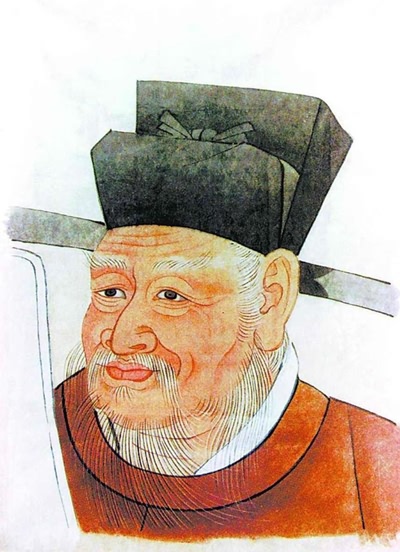Bao Zheng
 |p=Bāo Zhěng|w=Pao1 Cheng3|j=Baau1 Cing2|y=Baau1 Ching2|poj=Pau Chín|buc=Bău Cīng}}
|p=Bāo Zhěng|w=Pao1 Cheng3|j=Baau1 Cing2|y=Baau1 Ching2|poj=Pau Chín|buc=Bău Cīng}}Bao Zheng (; 5 March 999 – 3 July 1062), commonly known as Bao Gong (), was a Chinese politician during the reign of Emperor Renzong in China's Song Dynasty. During his twenty-five years in civil service, Bao was known for his honesty and uprightness, with actions such as impeaching an uncle of Emperor Renzong's favourite concubine and punishing powerful families. His appointment from 1057 to 1058 as the prefect of Song's capital Kaifeng, where he initiated a number of changes to better hear the grievances of the people, made him a legendary figure. During his years in office, he gained the honorific title Justice Bao () due to his ability to defend peasants and commoners against corruption or injustice. Bao Zheng is depicted as the incarnation of the Astral God of Civil Arts (Wenquxing, 文曲星), while another protagonist — famous Northern Song warrior Di Qing as the Astral God of Military Arts (Wuquxing, 武曲星).
Bao Zheng today is honored as the cultural symbol of justice in Chinese society. His largely fictionalized ''gong'an'' and ''wuxia'' stories have appeared in a variety of different literary and dramatic mediums (beginning with ''The Seven Heroes and Five Gallants''), and have enjoyed sustained popularity. In mainstream Chinese mythology, he is often portrayed wearing a judge's zhanjiao futou hat and a crescent moon on his forehead. Some Chinese provinces later deified Judge Bao, equating him to the benevolent war god Guan Gong. Provided by Wikipedia
Showing 1 - 15 results of 15 for search 'Bao Zheng', query time: 0.04s
Refine Results
-
1
Energy Trading Strategy for Heat and Electricity-Coupled Microgrid Based on Cooperative Game by Cheng Zhou, Chang Bao Zheng
Published 2022-06-01Get full text
Article -
2
Status and trend analysis of neuropsychological development of children aged 0‒2 in Tongzhou, Beijing, 2017‒2021 by HU Yue, BAO Zheng, HOU Yueyun, NIU Liwen
Published 2023-05-01Get full text
Article -
3
Sodium (1R,2S,5S)-2-hydroxy-6,6-dimethylbicyclo[3.1.1]heptane-2-carboxylate pentahydrate by Shi-Ying Ma, Ze-Bao Zheng, Ji-Kun Li
Published 2008-01-01Get full text
Article -
4
-
5
-
6
Passive Localization Algorithm for Radiation Source Based on Long Synthetic Aperture by WANG Yuqi, SUN Guangcai, YANG Jun, XING Mengdao, YANG Xiaoniu, BAO Zheng
Published 2020-02-01Get full text
Article -
7
-
8
(2E,6E)-2,6-Difurfurylidenecyclohexanone by Zi-Ying Wang, Yi-Feng Sun, Ze-Bao Zheng, Shi-Ying Ma
Published 2009-12-01Get full text
Article -
9
Concentration and Fractionation of Rare Earth Elements in Soils Surrounding Rare Earth Ore Area by WANG Xue-feng, XU Chun-xue, GU Xue, WANG Ya-ping, LI Kai, BAO Zheng-yu
Published 2019-03-01Get full text
Article -
10
Liver proteomic analysis reveals the key proteins involved in host immune response to sepsis by Yingying Chen, Hui Gong, Donge Tang, Lan Yu, Shoubin Long, Bao Zheng, Dixian Luo, Anji Cai
Published 2023-05-01Get full text
Article -
11
Anti-Inflammatory Effects of Huangqin Decoction on Dextran Sulfate Sodium-Induced Ulcerative Colitis in Mice Through Regulation of the Gut Microbiota and Suppression of the Ras-PI3... by Min-yao Li, Hui-juan Luo, Xue Wu, Yu-hong Liu, Yu-xuan Gan, Nan Xu, Yao-min Zhang, Yao-min Zhang, Shu-hua Zhang, Chang-lin Zhou, Zi-ren Su, Xiao-qi Huang, Xue-bao Zheng, Xue-bao Zheng
Published 2020-01-01Get full text
Article -
12
-
13
-
14
-
15
Amniotic-fluid-derived mesenchymal stem cells overexpressing interleukin-1 receptor antagonist improve fulminant hepatic failure. by Yu-Bao Zheng, Xiao-Hong Zhang, Zhan-Lian Huang, Chao-Shuang Lin, Jing Lai, Yu-Rong Gu, Bin-Liang Lin, Dong-Ying Xie, Shi-Bin Xie, Liang Peng, Zhi-Liang Gao
Published 2012-01-01Get full text
Article